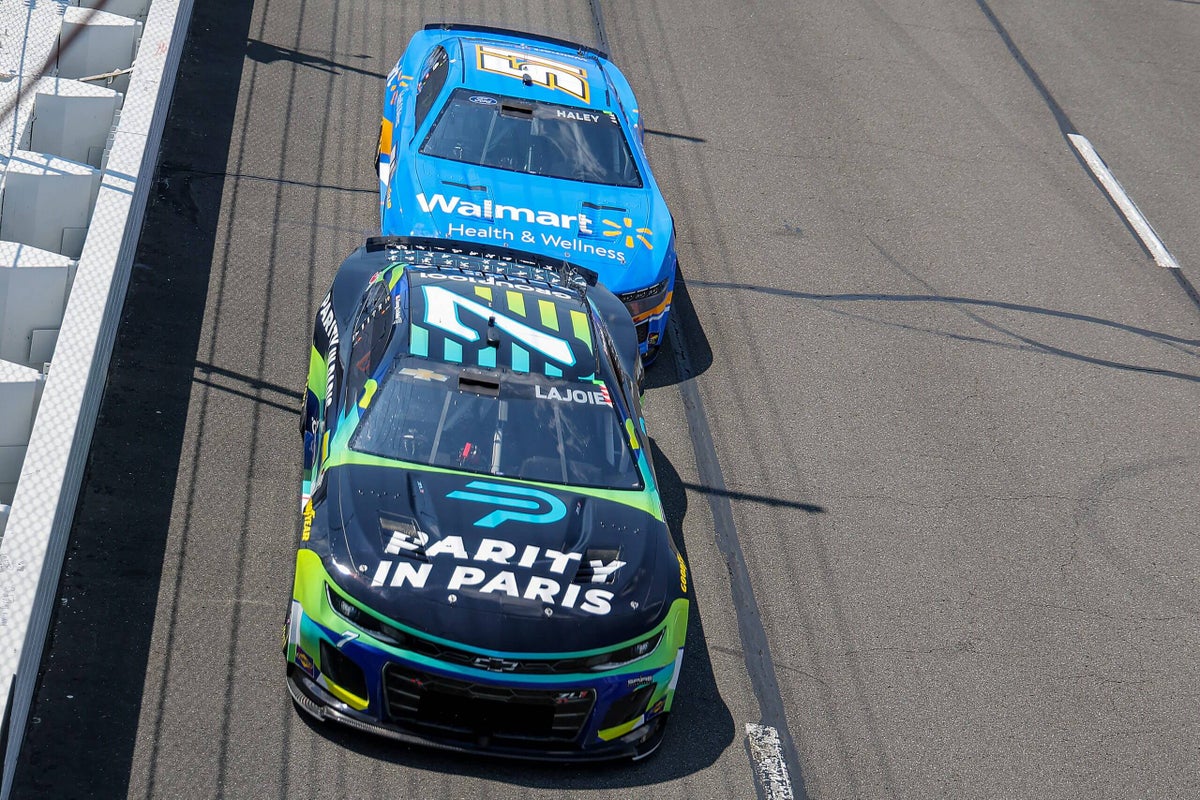BRISTOL, Tenn. — In what is effectively NASCAR’s version of an in-season trade, Spire Motorsports and Rick Ware Racing will swap their drivers, Corey LaJoie and Justin Haley, beginning with next weekend’s Cup Series race at Kansas Speedway.
The two organizations announced the swap at a joint news conference Friday that will see LaJoie go into the RWR No. 51 Ford and Haley into the No. 7 Chevrolet at Bristol Motor Speedway, the site of Saturday night’s race. Making the move now will allow each driver to get a jumpstart with the team they’ll likely be driving for during the 2025 season.
Spire co-owner Jeff Dickerson confirmed that Haley will continue into 2025 to drive its No. 7 car full time. Although RWR did not confirm that LaJoie would remain with the team beyond the final seven races of this season, LaJoie is considered the leading contender to do so, according to sources briefed on the situation.
Both LaJoie and Haley had been pursuing other opportunities for next year. Spire announced in July that LaJoie would not return to the organization in 2025. The team had not named LaJoie’s replacement, but Haley was identified by sources briefed on the situation as the likely replacement as he was seeking to leave RWR after one year with the team.
Haley, 25, is considered one of NASCAR’s more talented up-and-coming young drivers and his returning to Spire on a full-time basis is a reunion of sorts as he drove part time for the team across multiple seasons, a stint that included delivering Spire its lone Cup victory to date when he won the 2019 summer race at Daytona.
Haley joins a Spire team that is much different than the one he was with previously. Over the past few years, Spire has invested significantly in growing its Cup program. These efforts include adding three full-time teams that necessitated acquiring two charters, purchasing Kyle Busch Motorsports’ Truck Series team and its building and recently signing veteran driver Michael McDowell and championship-winning crew Rodney Childers, both of whom will join the team next year.
LaJoie is joining an RWR operation that has also undergone several changes to improve its overall competitiveness. The extensive changes have seen RWR invest additional resources, entering into a technical alliance with RFK Racing, hiring several behind-the-scenes personnel and signing Haley, which was considered a surprise as it was out of character for the team.
That LaJoie, 32, has vast experience in helping small teams grow is seen as a key tenet to why RWR signed him as Haley’s replacement.
Why the swap makes sense for both sides
NASCAR trades are surprisingly rare, but there’s a reason. Sponsorship is such a major part of stock car racing, that the companies that have signed on to fund a car are often connected to the driver. There are also manufacturer conflicts that can play a role. It’s not as simple as just swapping contracts for the remainder of the season like in baseball.
But when all parties get on board, it’s feasible. In this situation, the move makes perfect sense. Haley was replacing LaJoie in the No. 7 car next year anyway, and LaJoie is in talks for the ride that happened to be Haley’s current one.
So while the moves were originally separate, the teams and drivers were all on board with the concept of getting a head start on next year for the final seven races of the season. Haley asked to be released from his contract early, but RWR needed LaJoie to also be freed up to allow such a move to occur before the end of 2024.
That occurred within the last 36 hours, RWR president Robby Benton said.
“It’s unique, it’s unconventional,” Benton said. “Driver swaps, player trades — they’re very different for what we do (in NASCAR). But it’s important to tell you it’s all amicable.”
To Benton’s point, this is a pretty unusual situation that hasn’t happened recently. There have been scenarios in the past when drivers started with their future team before the season ended (Kurt Busch went to Furniture Row Racing for the final six races of 2012 and Jeff Burton departed for Richard Childress Racing with 14 races remaining in 2004, as two notable examples). But the closest example to the last true “swap” was in 2003, when Jeff Green and Steve Park switched rides.
“You could see more of this,” Benton said. “This was a bit simpler because of the relationships we have here. We’re all winning here and we’re doing something there that is good for everyone.”
Required reading
(Photo: Jonathan Bachman / Getty Images)

